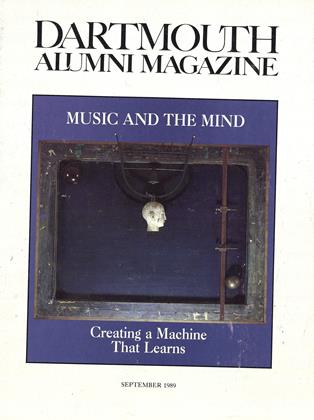Stephen Winship '41, A TestingTime: Crisis and Revival in Nashua (The Nashua-New Hampshire Foundation in cooperation with The New Hampshire Historical Society) Winship writes, "Capitalism, a free economy, various authorities have said, involves a continuous process of change including the end of some established activities from which new ones emerge." As he traces the social and economic history of Nashua, New Hampshire, Winship tells a story repeated throughout New England: how the closure of century-old textile mills challenged the well-being of individuals and the town itself.
Charles F. Herberger '42, ThreeCenturies of Centerville Scenes: Vignettesof a Cape Cod Village (Centerville Historical Society) This account of Centerville's past is enriched with photographs of the town's buildings and key citizens. Herberger is Professor of English Emeritus at Maine's Nasson College.
Coach Coachman '47 and Marina Tarlinskaya, Cooking Russian in America (Peanut Butter Publishing) More than just a cookbook, this is a personal discourse on Russian cooking, eating, and manners of life. Coachman, who is a professor of oceanography, met Tarlinskaya, a Russian lingustics professor, in Moscow and married her five years and numerous meals later.
William F. Stark '50, Wisconsin,River of History (Worzalla Publishing)— From the days of Marquette and Jolliet's explorations to the times of Frank Lloyd Wright, Stark documents the settlement and use of the Wisconsin River area. Writer-historian Stark enlivens this journey down the river and through time with numerous photographs.
George A. Seielstad '59, The Heartof the Web: The Inevitable Genesis ofIntelligent Life (Harcourt Brace Jovanovich)—Astronomer Seielstad writes, "A basic premise of this book is that life is an integral component of the universe. Cosmology and biology are not separate disciplines, since life cannot be understood without tracing the origin and evolution of the universe; nor can the universe be comprehended without considering the life residing within it." Drawing on astronomy, physics, anthropology, and biology, he examines, in a highly readable way, the connections between the physical nature of the universe and human intelligence—and the need to use that intelligence to safeguard the planet. Seielstad is assistant director of the National Radio Astronomy Obeservatory.
Ralph B. Taylor '73 , Human Territorial Functioning: An Empirical, Evolutionary Perspective on Individual andSmall Group Territorial Cognitions, Behaviors and Consequences (Cambridge University Press)— Taylor examines the small-group level of human territoriality: the association of sentiments, perceptions, and behaviors with specific places. He is a professor of criminal justice at Temple University.
Dan Gilroy '81, Sight Unseen (Carroll & Graf)—Opening with the sinking of a Russian submarine, Gilroy delivers national security intrigue and Cold War rationales in his fast-paced firstnovel. The New York Times calls it "a clever, smoothly written piece of work that is never dull." Gilroy is a New York-based screenwriter.
Lynda E. Boose and Betty S. Flowers, editors, Daughters & Fathers (Johns Hopkins University Press)— Newly-tenured Dartmouth English professor Boose has compiled ground-breaking analyses of how daughter-father relationships are portrayed in literature and in cultural myths. The book grew out of Boose's examination of "The Father and the Bride in Shakespeare." For this volume, she assessed the structures of the daughter-father relationship in Western culture.
 View Full Issue
View Full Issue
More From This Issue
-
 Cover Story
Cover StoryMUSIC AND THE MIND
September 1989 By Jay Heinrichs and Karen Endicott -
 Feature
FeatureA Cure for Nostalgia: the Ultimate Comp Exam
September 1989 By Nancy Staab '90 -
 Feature
FeatureSAILING FOR HOME
September 1989 By Heather Killebrew '89 -
 Feature
FeatureSon of Animal House
September 1989 By Ed. -
 Article
ArticleThe man who wrote the movie returns to find brothers in slime.
September 1989 By Chris Miller '63 -
 Article
ArticleDR WHEELOCK'S JOURNAL
September 1989
Article
-
 Article
ArticleALUMNI RETURN TO HANOVER FOR FEBRUARY 22
April, 1923 -
 Article
ArticleMasthead
NOVEMBER 1984 -
 Article
ArticleMcCullochs endow fund
JANUARY/FEBRUARY 1985 -
 Article
Article"More like a house"
OCTOBER 1984 By Dana Cook Grossman -
 Article
ArticleWith the D. O. C.
December 1938 By J. W. Brown '37. -
 Article
ArticleThe Good Old Days?
JULY 1967 By JACK HURD '21

